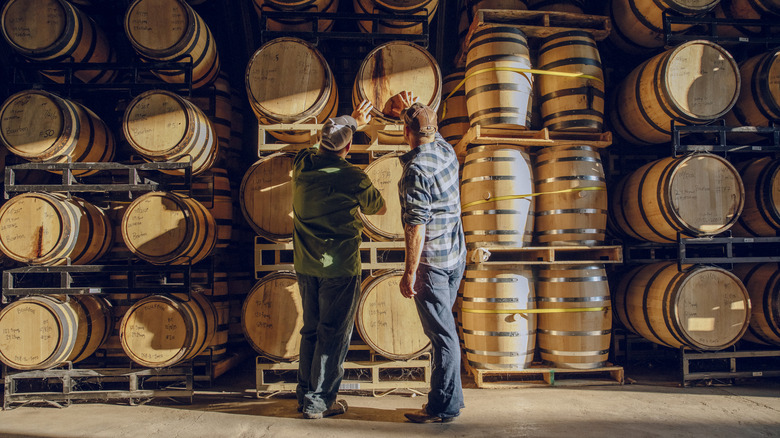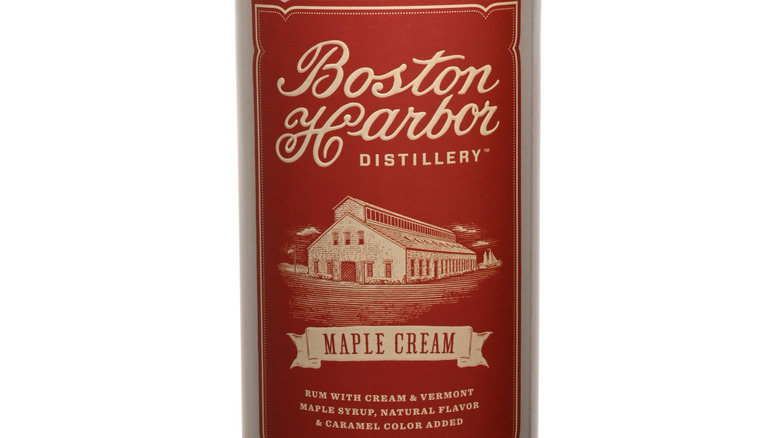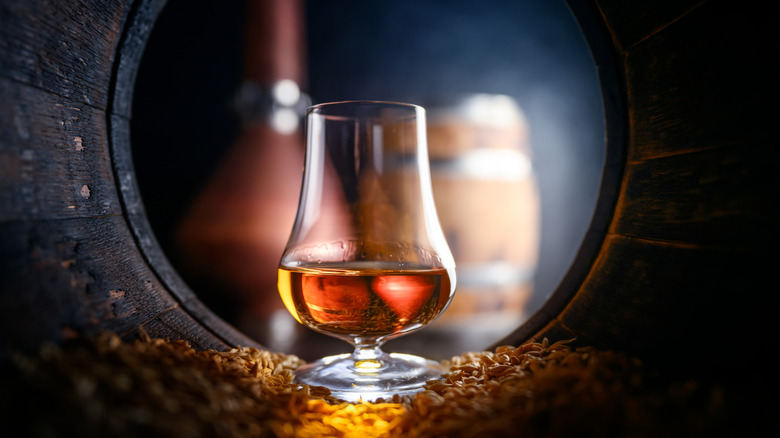A Major Alcohol Brand Just Filed For Bankruptcy
Times are tough for the food and beverage industry. Between Trump's tariffs set to hit small businesses hard, retaliatory tariffs impacting global and domestic supply chains — in addition to impacting impacting family budgets – and the overall trend of beloved restaurants contending with bankruptcy, things are not looking good. Plus, the impact of tariffs on wine, beer, and alcohol makes the current — and forecasted – economic environment downright hostile for the hospitality industry.
Boston Harbor Distillery has become yet another addition to this recent struggle, even though the brand once seemed destined for success. Boston Harbor Distillery was founded in 2012 by Rhonda Kallman, who co-founded the wildly successful Boston Beer Company with Jim Koch in 1984. Boston Beer Company is best known as the brewer of Samuel Adams Boston Lager, an early microbrew that helped to kickstart the greater American craft brewing craze — long before the trend gained mainstream popularity. While Kallman seemed poised to replicate similar success in the craft spirits arena with Boston Harbor Distillery, in March 2025 the company filed for Chapter 11 bankruptcy.
Boston Harbor Distillery's bankruptcy filing
Boston Harbor Distillery is physically based in the Dorchester, Massachusetts. Per the company's bankruptcy docket, Boston Harbor Distillery, LLC first filed for bankruptcy under Small Business Subchapter 7 provisions, which was converted to a Chapter 11 filing as of April 3, 2025.
Chapter 11 protection means a company can reorganize and restructure its debt, rather than immediately liquidate and sell off company assets. In the case of Boston Harbor Distillery, the company currently operates its flagship distillery and dining location on the Boston Harbor, as well as a Logan Airport offshoot. The filing also included a wide assortment of the company's products, ranging from whiskeys to gins to pre batched cocktails. With that in mind, it is still unclear what might change or even fall away during proceedings.
While reorganizing, the company has been granted permission to continue honoring gift certificates and event deposits already paid for by the time of filing. Boston Harbor Distillery lists $500,000 to $1 million in assets, and $1 million to $10 million worth of debts, including over $1 million of personal investment owed to primary creditor, Cheers Investment LLC.
An uncertain future
In a variety of interviews, Boston Harbor Distillery founder, Rhonda Kallman, has discussed the tough state (and brutal timing) of bringing a strong craft whiskey product to market. The timing, in particular, was not helped by the aftermath of the COVID-19 economy, the rise of the low or no-alcohol beverage trend, or the general consumer slowdown in spending due to factors like inflation fatigue and wage stagnation. Not to mention the punishing, uncertain environment that tariffs can and will create. Also, while Boston Harbor Distillery produces a number of spirits, Kallman's clear passion and stated focus has been on creating a successful craft whole grain rye whiskey, which is a pricier undertaking than corn-forward bourbon whisky.
Since the bankruptcy filing is fresh, there is still no word on what shape Boston Harbor Distillery will ultimately take as it undergoes Chapter 11. However, the company's website is still running, and it appears its flagship Boston Harborside distillery, dining room, and airport lounge are also all still operational. If the company can manage its debts in bankruptcy, succeed in the development of a key spirit gaining as much attention as, say, Chicago's divisive Jeppson's Malört, or even end up on the good side of a private equity buyout, there is a chance the Boston Harbor Distillery brand could emerge from bankruptcy with a raised glass and a call for one more round.


